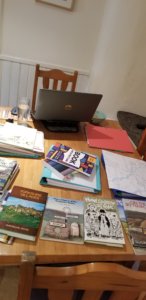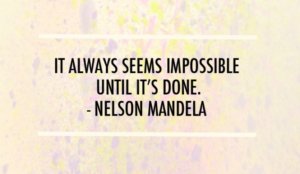 The post below about a writer’s personality ran six years ago, and something happened this past week that reminded me of how much we need other writers. I am blessed to have two such people as close friends: one who is my age and in relatively the same stage in life, and one who is 15 years older, who has weathered tougher times than I have and still kept her marvelous sense of humor. I hope to be like her someday. However, the first 2/3 of my writing life wasn’t like that, and I felt truly alone in this venture. If that sounds like you, read on (including the comments which I saved.) When I say that “we’re all in this together,” I mean it.
The post below about a writer’s personality ran six years ago, and something happened this past week that reminded me of how much we need other writers. I am blessed to have two such people as close friends: one who is my age and in relatively the same stage in life, and one who is 15 years older, who has weathered tougher times than I have and still kept her marvelous sense of humor. I hope to be like her someday. However, the first 2/3 of my writing life wasn’t like that, and I felt truly alone in this venture. If that sounds like you, read on (including the comments which I saved.) When I say that “we’re all in this together,” I mean it.
*******
If you’ve studied personality types, you may have noticed how many writers have a good dose of the Melancholy Temperament.
Some of the signs:
- You’re sensitive to your own feelings plus the vibes given off by others.
- You notice things that go over the heads of others.
- You love solitude—and need it to feel sane and calm.
- You like to think, and think deeply.
- You may be more of an observer at parties, avoiding the limelight if possible.
All those traits help your writing immensely. Other writers will love those traits in you.
Unwelcome Personality
Be warned, however. Many people in your life won’t like some of your creative personality. When that happens, it will feel like another form of rejection.
I was reminded of this when re-reading a terrific book called The Soul Tells a Story by Vinita Hampton Wright. Here’s what the author has to say about this:
“My gifts were always welcomed and encouraged in my family, church, and school communities. What was not welcomed was the personality from which those gifts spring. I was moody, easily depressed and extremely introverted. I had no social skills, was too honest when I talked, and didn’t know anything about flirtation or other forms of politics.” She added that she had “an overriding sense that people didn’t accept me as I was. I would be told to stop having a long face, that I should smile more, that I should be more outgoing…that to be inward was to be self-centered.”
If you have some Melancholy Temperament, and you also grew up in a dysfunctional environment, your personality traits may be even more pronounced.
Finding a Kindred Personality
I could really identify with Ms. Wright’s words. All my life I’ve been told that I think too much. So my best friend (a non-writer) shocked me when we first met. She said, “I like that you read a lot and think deeply.” She does too—and we bonded for life! You need to have such kindred souls in your life–even one will do.
I’m not saying we never need to change. And I’m not suggesting that you announce to your family “I’m moody because I’m a writer, so get over it” or snarl “Go away and leave me ALONE because I’m an introvert” or tell people off because you are honest.
On the other hand, stop tying yourself into a pretzel to be what someone else thinks you should be.
Be Grateful for Your Writer’s Personality
I’ve spent a lot of my life trying to “undo” my writer’s personality, not realizing what it was (or that it was part of a gift). You may find that there are few people that you can be your unvarnished self with. (I am blessed with a best friend, a dear sister, and another writer who let me relax and say whatever is on my mind and never judge or reject me. If you have even ONE person in your life where you can do that, you are blessed.)
With everyone else, I tone down the tell-it-like-it-is honesty, and I smile whether I want to or not. I developed social tricks to get others to talk so I didn’t have to. I’ve dumped my “unacceptable” feelings into journals for nearly thirty years.
I might not be as brave as some of you. Or maybe I’m just old enough to be too tired to deal with people who don’t understand me and don’t want to try. It stirs up exhausting discussions that go nowhere. I’d rather save that energy for my writing.
Put Your Writer’s Personality to Good Use
Don’t get me wrong. I don’t stuff things till I implode. (I used to–bad for the blood pressure!) Instead, I pour those in-your-face honest feelings into my fiction and nonfiction. I let characters say things I don’t say anymore. I tend to create characters that feel like they’re out of the mainstream socially. And I love characters who are sensitive and probably think too much.
Ms. Wright says: “Creativity takes you places that are weird to others. Don’t be surprised when others reject you for being different, asking too many questions or expressing yourself in ways that are unfamiliar to them.”
You’re not alone if you get this type of reaction fairly often. Just be sure to hang out with people—like me—who will value your writer’s personality. They’re out there. Look for them, and don’t stop till you find one. I was in my late 30s before I found a truly kindred soul.
When you find someone who likes your writer’s personality, you may find out that they’re undercover writers as well. If so, you’re doubly blessed.
If you’ve ever felt this way, please leave a comment! You’re among friends here! [NOTE: I understand that a security issue has blocked comments. I have a “work order” into Sucuri to get it fixed, in case you try to post and can’t. Argh!]



 Time to write.
Time to write. 


 everything I crammed into my brain last week. I take time first thing in the morning for prayer and reading. I don’t rush. Then I check the weather and enjoy watching the mail carrier go down the lane.
everything I crammed into my brain last week. I take time first thing in the morning for prayer and reading. I don’t rush. Then I check the weather and enjoy watching the mail carrier go down the lane. 









 Youth isn’t everything–not in physical endeavors, nor mental ones.
Youth isn’t everything–not in physical endeavors, nor mental ones. 



